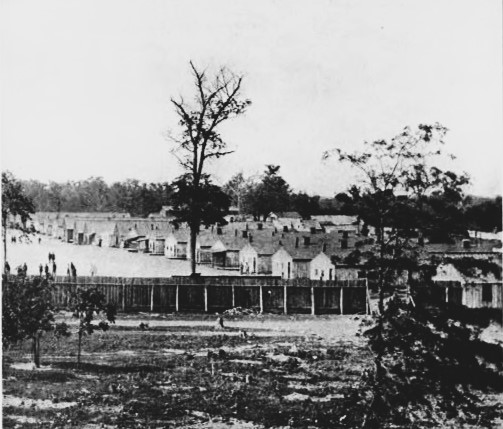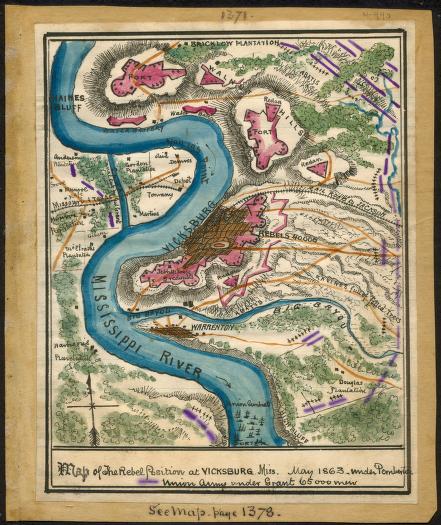Clinton G Wilson was one of the first ancestors I researched with the help of my grandmother. She had some letters from one of his daughters, so she was able to give me some guidance.
Wilson enlisted on August 12, 1862 at Camp Butler near Clear Lake in Sangamon County, Illinois. His family recalled : “When President Lincoln called for men in 1861 he presented himself at Springfield, for service. He was one inch short of the regulations and was rejected. He then went to Missouri and there was also rejected. Returning to Springfield he waited for the second call and at this time, regulations were not so strict.” According to his military record, Wilson was 5’4″, had dark hair and eyes and a dark complexion. He was twenty years old. Camp Butler had been formed a year earlier as the state of Illinois was called on to provide soldiers to the Union Army, replacing an older and smaller military camp nearer to the town of Springfield. His training lasted for about a month, and then he was assigned to Company C of the 114th Illinois Infantry.

Company C moved to Memphis, Tennessee in November 1862. After fighting in Mississippi and Jackson, Tennessee, they went back to Memphis, where they guarded the railroad. The following spring, they travelled down the Mississippi to Young’s Point, at the bend in the river on the Louisiana side opposite Vicksburg, Mississippi. As the Union Army landed their troop transports and supplies, the Confederate Army melted away from Young’s Point. The 114th Infantry joined the Vicksburg Campaign on May 2, 1863.

The fortress city of Vicksburg, known as “the Gibraltar of the Confederacy,” was the last remaining place on the Mississippi the Confederates controlled at this point of the war, and General Grant had to have it to gain control of the river. The loss of Vicksburg would split the confederate controlled land in two. Many, including General Sherman viewed the attempt to take Vicksburg as hopeless, but President Lincoln was adamant that Grant succeed. Four previous attempts had failed. This time, Grant lead his army south through Louisiana south of Vicksburg, across the river and north again through Mississippi. The Confederates armed the bluffs. On May 19, Grant sent a small number of men to attack and they failed. On May 22, a larger attack by the full army was no more successful. The Union Army had 3200 casualties, and one of these, I believe, was Clinton Wilson. His family recalled that he was wounded on May 20 of that year.
On May 2, 1863, it joined in the movement to the rear of Vicksburg; was engaged in the battle of Jackson, losing 5 men killed and wounded; arrived in the rear of Vicksburg on May 18 and participated in the siege, with a loss of 20 men in killed and wounded
For the next 6 weeks, the city was under siege. The Union troops dug trenches, and even tunneled into the stronghold, but were repelled. Grant was planning another all out assault on the city when Confederate General Pemberton surrendered on July 4, 1863, because his men and the townspeople were sick and starving. Wilson’s brother James, a signal officer also at Vicksburg, claimed to have sent Grant’s message of victory to Admiral Porter as an order to cease fire.
Wilson survived, but was severely wounded in the thigh. According to his daughter, Myrtle,
my dad was in Civil War and his soldier coat and leather pouch (with shells and empty bullets he picked up on fields) are in trunk at Betty’s. Orvill had the old leather purse that he had in his pocket when shot at battle of Vicksburg. But don’t know where it is now. Neva said Lester had it. It has a hole through it and did save his life. He was left on battlefield for 24 hours for dead after the siege of Vicksburg. When they came to pick up the dead, someone saw his eyelid move, so he was taken to hospital. All but 4 or 5 of his company were killed. He had the only piece of their flag left clutched in his hand. It was a piece 12 inch square and is in a museum in Springfield, Ill.
According to his daughter Nellie, he spent four months recovering. He then served until August 3, 1865. He mustered out in Vicksburg, so was probably part of the occupying army who rebuilt the town and its environs, building schools and organizing a new system of paid agricultural labor.
Sources:
https://core.ac.uk/download/pdf/62411626.pdf History of Camp Butler
https://publish.illinois.edu/ihlc-blog/2022/07/19/camp-butler-in-springfield-illinois/?_page=2 History of Camp Butler
https://www.nps.gov/vick/learn/historyculture/114th-illinois-infantry.htm Monument to the 114th